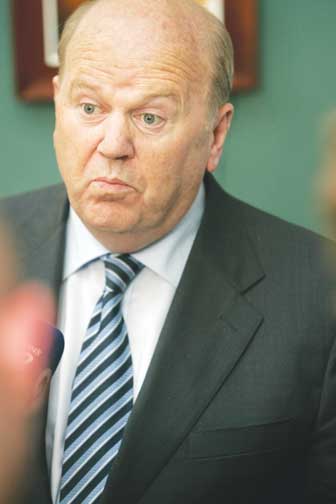


SERVICES
Tuesday October 12, 2010
Call For National Consensus On Budget Gets Cool Response
Fine Gael Finance spokesman Michael Noonan said it was impossible for his party to support the Government's fiscal plans, because they had no idea what exactly they were (Photocall) There's been a lukewarm response to a suggestion from Green Party leader John Gormley that cross-party talks should be held to formulate an agreed budgetary plan for the next four years. Under his plan, social partnership-style discussions involving leading figures from all the main parties and officials from the Department of Finance would take place, in a bid to get consensus around a four-year budget plan due to be unveiled in November. But the proposal was not embraced with any enthusiasm by the Opposition, and one of the coldest reactions of all, came from his partner in government, Taoiseach Brian Cowen. As the scale of the Ireland's economic crisis becomes clearer by the day, Mr Gormley said it was time to put party politics aside for the sake of the country. It was a call that had been made by several elder statesmen in recent weeks including former Taoiseach Garret Fitzgerald, and former EU commissioners Peter Sutherland and Ray MacSharry. "It's gone way beyond that (party politics)," said Mr Gormley, "it's about the future of this country and that is why we need a great deal of national consensus on these issues at this stage, and if necessary going forward, we have to look at the option of a national government." But Taoiseach Brian Cowen emphatically ruled out the idea of an all-party national government. "I don't see it as being relevant to our present situation," he said, "We have a job to do in the coming weeks, we need to get on with that job, and the last thing we need to be doing is, in my opinion, creating any further degree of political uncertainty about that." And while he ruled out any all-party economic forum, he said consensus on the budget would be welcome. The government has already taken the unusual step of arranging for officials from the Department of Finance to brief the Opposition on the exact budgetary position, and provide costings for any proposals they may have. "Clearly if was possible to get a political consensus based on the work that is ongoing, of course that would be welcome," Mr Cowen said. Fine Gael Finance spokesman Michael Noonan said it was impossible for his party to support the Government's fiscal plans, because they had no idea what exactly they were. And he said there was no way the main opposition party would be writing the government a blank cheque ahead of December's budget. "Surely no one is suggesting that Fine Gael should blandly agree to whatever the Government produces, whatever this may be?" he said. "We have no problem giving assurances that we're committed to the broad fiscal correction, but there are no circumstances in which we'll be tied to the individual cuts or tax increases which may be proposed by the government." Labour leader Eamon Gilmore said he would be prepared to talk to anyone in the national interest, but the idea of a national consensus was just an attempt to keep the government in power. He said what was needed is a general election: "We need a new government with a mandate from the people." Sinn Fein said some kind of national consensus could be looked at, but only after a general election. Ireland is bracing itself for cuts of up to €4.3bn in December's budget. All the opposition parties have accepted the broad target of reducing the budget deficit to 3% of GDP by 2014. A four year plan is to be published by the government in November, in a bid to reassure international markets. But no-one expects the Fianna Fail-Green coalition to still be in power for most of that period - and that's why many believe the only way to reassure the bond markets is to have all-party agreement. A general election would almost certainly be needed before any national government - or even national consensus - could be formed. |
CURRENT ISSUE

RECENT ISSUES


SYNDICATE
[What is this?]
POWERED BY

HOSTED BY

Terms of Service | Privacy Policy
Website Design By C3I






